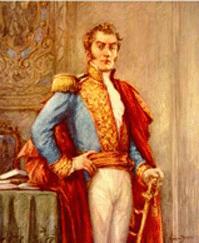- Antonio Nariño
Infobox Officeholder
name =Antonio Nariño

caption ="The Precursor"
office =Governor President of the State of Cundinamarca and Viceregent of the King's Person
term_start =September 21 ,1811
term_end =August 19 ,1812
monarch =Ferdinand VII
predecessor =José Tadeo Lozano
successor =Manuel Benito de Castro
office2 =Governor President of the State of Cundinamarca and Vicegerent of the King's Person
term_start2 =September 12 ,1812
term_end2 =September 19 ,1813
monarch2 =Ferdinand VII
predecessor2 =Manuel Benito de Castro
successor2 ="Himself" *
office3 =Governor President of the State of Cundinamarca
term_start3 =September 19 ,1813
term_end3 =May 14 ,1814
predecessor3 =Manuel Benito de Castro
successor3 =Manuel de Bernardo Álvarez del Casal
office4 =Vice President of the Republic of Colombia
term_start4 =April 4 ,1821
term_end4 =June 6 ,1821 •
president4 =Simón Bolívar
birth_date =April 9 ,1765
birth_place =Bogotá ,Cundinamarca
death_date =December 13 ,1823
death_place =Villa de Leyva ,Boyacá
party =Centralist
spouse =Magdalena Ortega y Mesa
religion =Roman Catholic
footnotes =*Cundinamarca abolished its monarchy, and the president no longer served as the Vicegerent of the King's Person.•Resigned.Antonio Nariño was an ideological and one of the early political and military leaders of the independence movement in
Colombia , then known as New Granada. Nariño was born in Santa Fé deBogotá in 1765 and died inVilla de Leyva in 1823.Early political activity
In 1794 he translated the "
Declaration of the Rights of Man " from its original French. For this he was imprisoned ten years by the Spanish authorities. Nariño had previously worked as a tax collector ("Recaudador de diezmos") and was also accused of fraud resulting from this activity.However, he escaped from his captors as the ship landed in
Spain and later went toFrance andEngland , where he continued his work supporting the revolution inSouth America .Some of his detractors claimed that he was persecuted due to his failure to come up with certain funds he had access to as a tax collector, and not necessarily due to political motives. In light of this charge, they argued that he escaped and promoted revolution to be able to safely return to New Granada.
The authorities again caught up with him in
Bogotá . This time he was imprisoned inMadrid but somehow managed to get away and return toColombia , where he was able to take part in the revolution. He founded the political newspaperLa Bagatela in 1811. That same year he was selected president of the State ofCundinamarca .Recognized as the commander of the
centralist republican forces in New Granada, he fought several battles against thefederalists organized around the city of Cartagena.outhern campaign
In July 1813, General Nariño began an intensive military campaign against the Spanish and Royalist forces in the south, intending to reach
Pasto and eventuallyQuito .Nariño's forces, known as the Army of the South, numbering 1500 to 2000 men, managed to capture
Popayán in January 1814 after defeating the Royalist forces in the area in a series of initially successful battles.After stopping to reorganize the city's government and his own forces, he pressed on towards Pasto. Historians have speculated that, had he not stopped at Popayán but actually decisively pursued the fleeing Royalist army, he might have been able to successfully capture a relatively undefended Pasto.
As things happened, the constant raids of Royalist guerrillas, the harshness of the terrain, the lack of promised reinforcements from Antioquia, and the delays in bringing up his army's artillery contributed to weakening the morale of many of the troops under his command, when they had practically reached the gates of Pasto.
After being wounded during combat, a false rumor of his death was spread, and most of the remaining soldiers scattered, only some 400 returning back to Popayán. Nariño, left practically alone in the battlefield, attempted to hide, but surrendered himself when Royalist scouts found him. He was taken into
Pasto in May 1814, and then sent to the Royal prison atCádiz via Quito.Later years
Nariño was freed in 1821 after the revolt of
Rafael del Riego , and returned to his country, now independent from Spain after the republican victory at theBattle of Boyacá .Nariño was one of the candidates for the presidency of
Gran Colombia in 1821, where he lost toSimón Bolívar by the significant margin of 50 to 6 votes in the Congress held atCúcuta , finishing second. He also lost the election for vicepresident, asFrancisco de Paula Santander eventually defeated him by a 38 to 19 vote margin after several heated rounds of voting.References
*es icon [http://www.semana.com/wf_InfoArticulo.aspx?idArt=72591 El colombiano de todos los tiempos - semana.com]
*es icon [http://www.lablaa.org/blaavirtual/historia/bigan/indice.htm Biografía del General Antonio Nariño]
*es icon [http://www.lablaa.org/blaavirtual/historia/gorador/narino.doc Defensa ante el senado]Bibliography
* Blossom, Thomas. "Nariño: Hero of Colombian Independence". Tucson: University of Arizona Press, 1967.
* Crow, John Armstrong. "The Epic of Latin America". Berkeley and Los Angeles: University of California Press, 1992.
Wikimedia Foundation. 2010.
